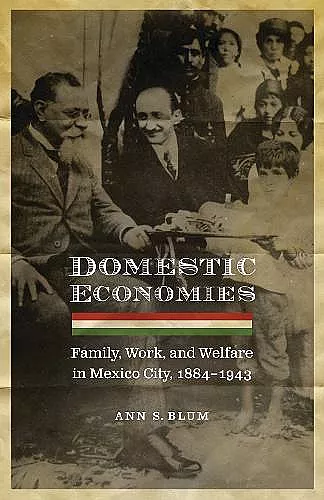Domestic Economies
Family, Work, and Welfare in Mexico City, 1884-1943
Format:Paperback
Publisher:University of Nebraska Press
Published:1st Jan '10
Currently unavailable, and unfortunately no date known when it will be back

Traces the institutional and political upheaval in modern Mexico from the Porfirian era through the revolution from the perspective of the family
Analyses family practices and class formation in modern Mexico by examining the ways in which family-oriented public policies and institutions affected cross-class interactions as well as relations between parents and children.When Porfirio Díaz extended his modernization initiative in Mexico to the administration of public welfare, the families and especially the children of the urban poor became a government concern. Reforming the poor through work and by bolstering Mexico’s emerging middle class were central to the government’s goals of order and progress. But Porfirian policies linking families and work often endangered the children they were supposed to protect, especially when state welfare institutions became involved in the shadowy traffic of child labor. The Mexican Revolution, which followed, generated an unprecedented surge of social reform that was focused on families and accelerated the integration of child protection into public policy, political discourse, and private life. In ways that transcended the abrupt discontinuities and conflicts of the era, Porfirian officials, revolutionary leaders, and social reformers alike invoked idealized models of the Mexican family as the primary building block of society, making families, especially those of Mexico’s working classes, the object of moralizing reform in the name of state construction and national progress. Domestic Economies: Family, Work, and Welfare in Mexico City, 1884–1943 analyzes family practices and class formation in modern Mexico by examining the ways in which family-oriented public policies and institutions affected cross-class interactions as well as relations between parents and children.
"Blum's work is a major contribution to the nascent field of childhood history in Latin America. She draws from the historiography of gender and welfare to reflect how class, race, and gender interplayed in defining family relations and nation-state formation in modern Mexico."—Sandra Aguilar, H-Net|"Ann Blum makes an important contribution to the history of childhood, family, and labor and helps tie together labor, cultural, and political histories."—Susie S. Porter, Americas|"Blum uses an impressive array of sources—legal codes, decrees, censuses, court cases, articles, and welfare records. Her work sits at the intersection of multiple historiographies, not just family history, but also the history of women, gender, legal, labor, medical, and childhood as well."—Nicole Sanders, Mexican Studies|"[Domestic Economies] is a ground-breaking and important work that contributes not only to our understandings of family and work in Porfirian and revolutionary Mexico but also to wider historiographies of welfare, social policy, labor, and women."—Patience A. Schell, American Historical Review
ISBN: 9780803213593
Dimensions: unknown
Weight: unknown
396 pages